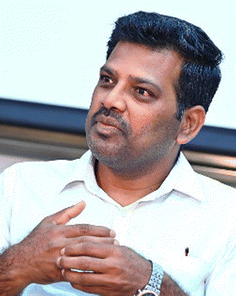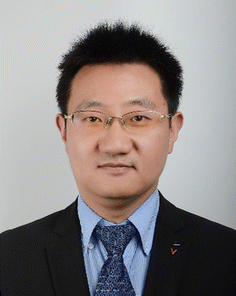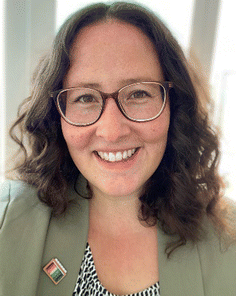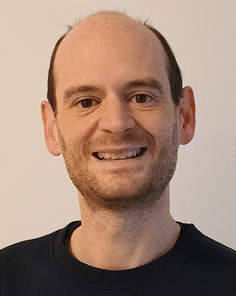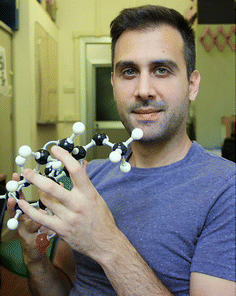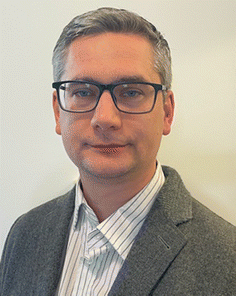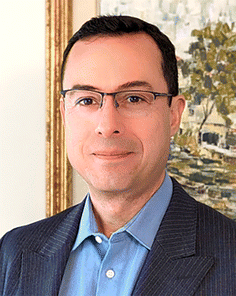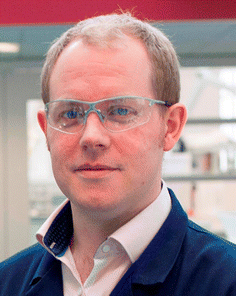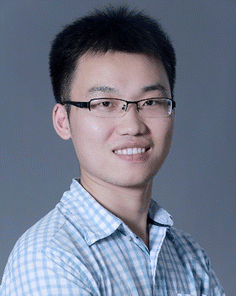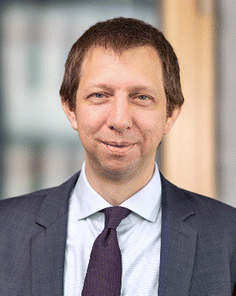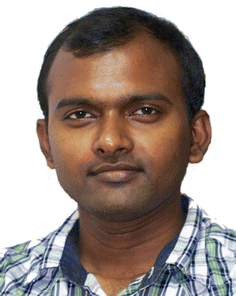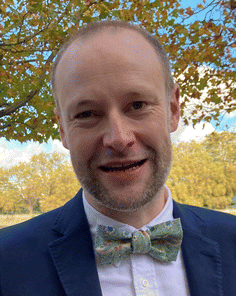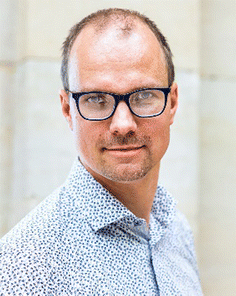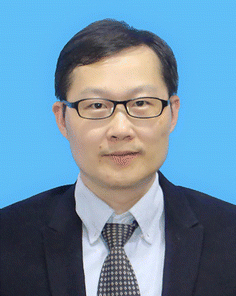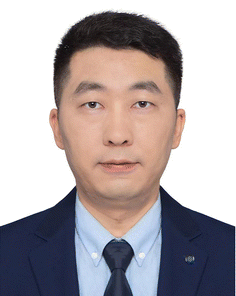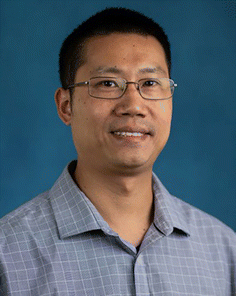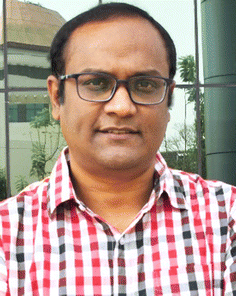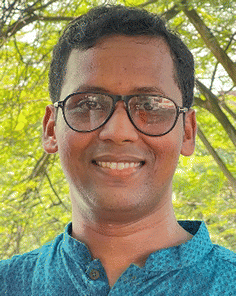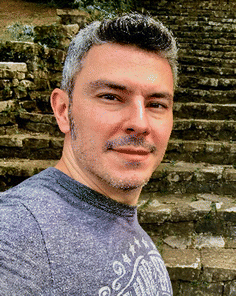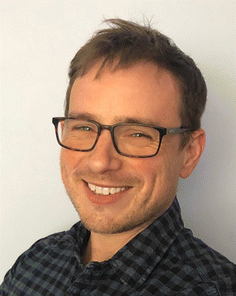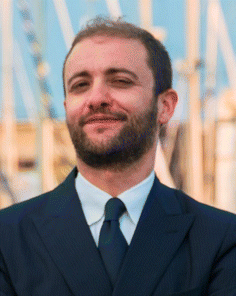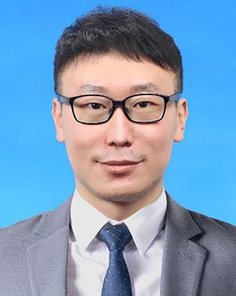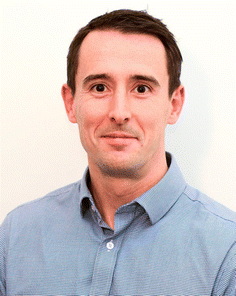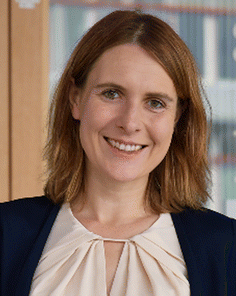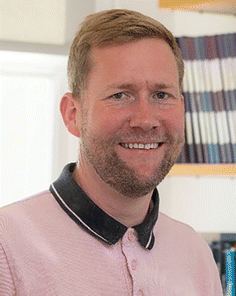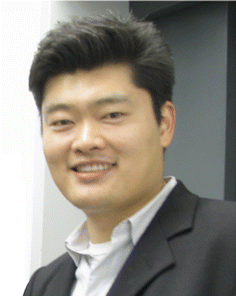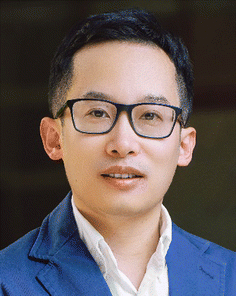DOI:
10.1039/D3CC90408C
(Profile)
Chem. Commun., 2024,
60, 2693-2699
Contributors to the Pioneering Investigators collection 2023: Part 3
Ekambaram Balaraman is an Associate Professor of Chemistry at the Indian Institute of Science Education and Research (IISER) Tirupati, India. He works on the design and development of catalysts/catalytic materials based on non-precious metals for sustainable chemical synthesis from feedstocks via dehydrogenation chemistry. He earned his PhD from the University of Hyderabad, India, and obtained an FGS-postdoctoral fellowship from the Weizmann Institute of Science, Israel. He started his independent career at the CSIR-NCL, Pune, India, in June 2013. He is a Fellow of the Royal Society of Chemistry, UK, and has been a member of the advisory board of Synlett since 2022.
Rui Cao received his BS (2003) in chemistry from Peking University in Beijing, China and his PhD (2008) from Emory University in Atlanta, Georgia, USA with Professor Craig L. Hill. He worked as a Postdoctoral Fellow (2008–2009) at Emory University and was the Dreyfus Postdoctoral Fellow (2009–2011) at Massachusetts Institute of Technology with Professor Stephen J. Lippard. In 2011, he became a professor at Renmin University of China, and transferred to Shaanxi Normal University in 2014. His main research interests are in bioinorganic chemistry and catalysis for energy-related small-molecule activation reactions. He has served on the Advisory Board of
Chemical Society Reviews since 2019.
Lena J. Daumann obtained her Diploma in Chemistry in 2010 from the University of Heidelberg. After an internship at BASF she completed her PhD in 2013 at the University of Queensland in Australia working on pesticide-degrading enzymes and biomimetic complexes. Her postdoctoral work at UC Berkeley involved luminescent lanthanide complexes with siderophore-inspired ligands. She took up a W2 Professorship at the LMU Munich in 2016 and moved to Duesseldorf to become the Chair for Bioinorganic Chemistry at HHU in 2023 where she continues to explore the bioinorganic chemistry of lanthanides to find new solutions for the separation and recycling of these elements.
Peter Dedecker is an associate professor at KU Leuven in Belgium. He received his PhD in Chemistry in 2009 from KU Leuven, followed by postdoctoral stays at KU Leuven in the group of Prof. Johan Hofkens and at the Johns Hopkins School of Medicine in the group of Prof. Jin Zhang. Since 2015, he has been heading the Lab for Nanobiology, where his work focuses on the development of novel methodology and tools for the visualization and spectroscopic study of complex (bio)chemical systems. Molecular probes for live-cell sensing, new optical and spectroscopic instrumentation, and new data analysis tools are particular interests.
Luca Dell’Amico completed is PhD at the University of Parma (Italy), under the supervision of Prof. Franca Zanardi (2014). He spent a research period with Prof. Karl Anker Jørgensen at Århus University (Denmark). In 2014, he was a Marie-Curie COFUND fellow with Prof. Paolo Melchiorre at ICIQ (Spain). In 2017, he started his independent career at the University of Padova. In 2019, he was the recipient of the Giacomo Ciamician medal from the Italian Chemical Society. In 2022, Luca was awarded an ERC starting grant to investigate new mechanistic pathways in organo-photoredox catalysis. His research targets the development and mechanistic understanding of novel photochemical processes.
Darren J. Derksen completed his PhD at the University of Alberta, Canada under the guidance of Prof. John C. Vederas. After post-doctoral research with Prof. Ian Paterson at Cambridge University, Dr Derksen began his independent career at St. Francis Xavier University in 2010. In 2014, he was recruited to the University of Calgary to take the Alberta Children's Hospital Junior Chair in Medicinal Chemistry. His research interests include protein degraders, synthetic methodology, and the molecular basis of pain and withdrawal.
Carlos Escobedo is Professor of Chemical Engineering at Queen's University, cross-appointed to the Department of Chemistry (Queen's), and to the Department of Physics and Space Science at the Royal Military College of Canada. He received a BSc from the National University of Mexico, MSc from the University of Toronto, and PhD from the University of Victoria, and was an NSERC postdoctoral fellow in the Bioengineering Laboratory at ETH Zürich, Switzerland. His research program involves the development of microfluidic systems, and micro- and nanostructures for analytical applications in biology, medicine and chemistry.
Ross Forgan is Professor of Supramolecular and Materials Chemistry at the University of Glasgow. He obtained his PhD from the University of Edinburgh in 2008, and carried out postdoctoral research with Prof. Sir J. Fraser Stoddart (Northwestern University) and Prof. Lee Cronin (University of Glasgow). He has been the recipient of a Royal Society URF (2012), an ERC Starting Grant (2016), the Sessler Early Career Researcher Prize (2018) and the RSC Bob Hay Lectureship (2020). His research into the application of metal–organic frameworks in biomimetic catalysis and nanoscale drug delivery is underpinned by fundamental studies into the self-assembly processes of porous materials.
Jinlin He obtained his BS degree in 2006 and PhD degree in 2012, both from the College of Chemistry, Chemical Engineering and Materials Science, Soochow University. He was awarded the CSC fellowship and studied in the group of Professor Stephen Z. D. Cheng at the University of Akron in 2010. Thereafter, he was appointed as a Lecturer at Soochow University in 2012, and has been a Professor since 2021. His research focuses on the synthesis of functional elastomers and biodegradable polyesters. He was selected as an Excellent Young Scholar of Soochow University, and
Journal of Materials Chemistry B Emerging Investigator in 2018.
Holger Helten is a Professor and Chair I at the Institute of Inorganic Chemistry and the Institute for Sustainable Chemistry & Catalysis with Boron (ICB) at the University of Würzburg, Germany. He received his PhD from the University of Bonn. After a postdoctoral stay at the University of Bristol (UK) with Prof. Ian Manners, he established an Emmy Noether group at RWTH Aachen University, before he moved to Würzburg as a Heisenberg Professor. His research interests focus on the development of new synthesis approaches and the application thereof to access functional hybrid materials, including polymers, polymer networks, and molecular materials.
Jennifer Hiscock is Professor of Supramolecular Chemistry at the University of Kent (UK). She is a UKRI Future Leaders Fellow and recipient of the Royal Society of Chemistry (RSC) Bob Hay Lectureship. Her research currently focuses on an interdisciplinary approach to applying supramolecular chemistry to solve real-world problems through the development of her patented Supramolecular Self-associating Amphiphile (SSA) and jointly invented Talin Shock Absorbing Material (TSAM) technologies. In addition, she was a founding member the international Women in Supramolecular Chemistry (WISC) network, and is the current Chair of the RSC Macrocyclic and Supramolecular Chemistry interest group.
Chandan K. Jana received his PhD in chemistry in 2008 from the University of Muenster, Germany, as a member of the International Graduate School of Chemistry. He was a postdoctoral fellow (2009–2011) at EPFL and the University of Basel, Switzerland. In 2011, he started his independent research career as an Assistant Professor in the Department of Chemistry at the Indian Institute of Technology Guwahati, where he became an Associate Professor in 2015 and then Professor in 2019. His research focuses on organic synthesis, in particular on the chemistry of heterocycles and terpenoids.
Christopher R. Jones is a Senior Lecturer at Queen Mary University of London. He obtained his PhD in organic chemistry under the supervision of Professor Martin D. Smith (University of Cambridge, 2009). He then moved to the University of Oxford as a Junior Research Fellow to work with Professor Timothy J. Donohoe. He joined QMUL in 2013 as a Ramsay Memorial Research Fellow and in 2015 was awarded an EPSRC Early Career Fellowship. His research interests are based on the development of new synthetic methods, with a particular focus on aryne chemistry and related applications in functional carbon nanomaterial preparation.
Robert Kretschmer is Professor of Inorganic Chemistry at the Chemnitz University of Technology. After working for several years as a lab technician in the pharmaceutical industry, he studied chemistry in Jena and obtained his PhD at the Technical University Berlin in 2012 under the guidance of Prof. Helmut Schwarz. After a postdoctoral stay with Prof. Guy Bertrand, he started his independent career in 2015 at the University of Regensburg. In 2019, he became a Junior Professor with Tenure Track at the Friedrich Schiller University Jena before moving to Chemnitz in 2022 as a Full Professor. His research focusses on ligand design, organometallic chemistry, and the utilization of cooperative effects in bond activation, catalysis, and materials research.
Yuekun Lai is the Fujian province Minjiang Scholar Professor at the College of Chemical Engineering at Fuzhou University, and served as Editor of the
Chemical Engineering Journal. He received his PhD degree in Chemistry from Xiamen University. He was selected as one of the 2018–2023 Highly Cited Researchers (Clarivate Analytics) and the recipient of the Humboldt Fellowship with Academician Prof. Lifeng Chi, and was selected for the
Journal of Materials Chemistry A (RSC) Emerging Investigators,
Advanced Materials Interfaces (Wiley) Hall of Fame, and
Industrial & Engineering Chemistry Research (ACS) Class of Influential Researchers award. His current research topics are bioinspired intelligent membranes, multiphase separation, filtration and catalytic purification applications.
Ya-Qian Lan received his PhD degree (2009) from the Faculty of Chemistry, Northeast Normal University. In 2010, he joined the National Institute of Advanced Industrial Science and Technology (AIST, Japan) as a JSPS postdoctoral fellow. He started his independent career at Nanjing Normal University in 2013. Now, he is a professor at South China Normal University. His research interests focus on the application of polyoxometalate-based composite materials in energy storage and conversion and crystalline porous materials (MOFs, COFs) for applications in catalysis and proton conduction.
Allen Liu is a biophysicist by training and is an Associate Professor of Mechanical Engineering at the University of Michigan. He obtained his PhD degree from the University of California, Berkeley and his post-doctoral training at The Scripps Research Institute. His lab's research lies at the interface of biology and engineering. They are interested in understanding how cells generate, sense, and respond to physical forces by building cell-like systems mimicking the mechanical and biochemical aspects of a cell. The interdisciplinary lab employs tools and techniques in biophysics, microengineering, synthetic biology, cell biology, biochemistry, and molecular biology.
Biplab Maji received his MSc in Chemistry from IIT Kanpur in 2009 and PhD from Ludwig-Maximilians-Universität München, Germany, in 2012, under the mentorship of Prof. Herbert Mayr. He then pursued post-doctoral research with Prof. Hisashi Yamamoto in Japan and with Prof. Frank Glorious in Germany. In 2016, Dr Maji joined IISER Kolkata as an assistant professor and became an associate professor in 2021. His research interests focused on organic synthesis and several aspects of catalysis, including hydrogen transfer catalysis, photocatalysis, and asymmetric catalysis.
Uttam Manna, FRSC, is currently affiliated with the Department of Chemistry, Centre for Nanotechnology and the Jyoti and Bhupat Mehta School of Health Science and Technology in the Indian Institute of Technology, Guwahati. He completed his Integrated PhD at IISc Bangalore in 2011. He pursued his post-doctoral research at the University of Wisconsin–Madison, USA. He was recognized as an emerging investigator by the
Journal of Materials Chemistry A,
Chemical Communications,
Nanoscale and
Chemical Society Reviews. He is also a recipient of the Humboldt Research Fellowship for Experienced Researchers and CRSI Bronze Medal (2023). His research team is interested in designing functional and durable bio-inspired coatings.
Danilo Mustafa obtained his PhD in Physics at the University of Campinas (Brazil, 2009) on the study of luminescent nanomaterials. During this period, he entered the chemistry world through a six-month stay at TCU, Texas (USA, 2005). Afterwards, he worked as an invited researcher at the Max Planck Institute, Stuttgart (Germany, 2009). In 2010, he joined KU Leuven (Belgium) to collaborate on the design of luminescent materials based on metal organic frameworks and layered double hydroxides. Since 2019, Danilo has been an Associate Professor at the University of São Paulo (Brazil) where his research focuses on the fundamental understanding and application of new hybrid luminescent materials.
Graham Newton is an Associate Professor in Inorganic and Materials Chemistry at the University of Nottingham, UK. He completed his PhD at the University of Glasgow in 2009 before moving on to a JSPS postdoctoral fellowship to the University of Tsukuba, where he stayed on as an Assistant Professor before moving to Nottingham in 2015. His research group works at the interface between the synthesis and characterisation of molecular materials, electrochemistry, and energy device fabrication.
Vittorio Pace is Full Professor of Organic Chemistry at the University of Turin (Italy). He received a PhD in Chemical Sciences from the Complutense University of Madrid in 2010. After postdoctoral training at Vienna, Manchester and Stockholm, he obtained a Tenure-Track Professorship at the University of Vienna, where he also received the Habilitation in Pharmaceutical Chemistry. His core research is represented by the design of new synthetic concepts with functionalized organometallic reagents with particular emphasis on homologation procedures. In this context, he edited a two-volume book for Wiley-VCH titled “Homologation Reactions: Reagents, Applications, and Mechanisms”, printed in July 2023.
Meng Qiu is an Associate Professor in the School of Chemistry and Chemical Engineering at the Ocean University of China. He received his PhD in Physical Chemistry from the Institute of Chemistry, Chinese Academy of Sciences. He then worked as a postdoctoral fellow and research professor in the group of Professor Jong Seung Kim at Korea University. His research interests include the design and synthesis of two-dimensional materials, novel optoelectronic characteristics, biosensors and innovative therapeutic strategies.
Allan Watson was born in Glasgow, UK, and obtained his MSci and PhD at the University of Strathclyde, then moved to the group of Prof Sir David W. C. MacMillan at Princeton as a Lindemann Fellow. He then completed an industrial postdoc at GlaxoSmithKline, Stevenage, UK, before returning to the University of Strathclyde for his independent research in 2011. He moved to the University of St. Andrews in 2018 and was promoted to Professor in 2021. His research interests are mechanisms, methods, and molecules.
Joanna Wencel-Delord received her PhD in 2010 from the University of Rennes 1, France. After a postdoctoral stay in the group of Prof. F. Glorius at Universität Münster (Germany), she joined the CNRS in 2013 as an associate researcher (University of Strasbourg, France). In 2021 she was promoted to CNRS Research Director and in 2023 she joined the University of Würzburg as an associate professor. Her research focuses on the metal-catalyzed (asymmetric) C–H activation, axial chirality and chemistry of hypervalent compounds. Her recent awards include the Bronze Medal of the CNRS, ERC-SG, Guy Ourisson award and M. Julia Prize for Emerging Talents. She has published >75 articles.
Paul Wilson is a Royal Society Tata University Research Fellow in the department of chemistry at the University of Warwick. He studied chemistry at the University of Bristol (MSci, 1st Class, 2006) before completing a PhD in organic chemistry (Warwick, 2010). He previously held a Leverhulme Trust Early Career Fellowship (Warwick, 2016–2019). His URF is focused on developing platforms for nanoscale synthesis and nanofabrication, through combining the capabilities of scanning electrochemical probe microscopy techniques with electrochemically-mediated organic, macromolecular and supramolecular chemistry. More broadly, the team are developing platforms for (macro)molecular electrosynthesis/functionalization across a variety of length scales.
Kai A. I. Zhang received his PhD from the University of Cologne and partly from the University of Strathclyde. After working as a postdoctoral fellow at the Max Planck Institute of Colloids and Interfaces, he joined the Max Planck Institute for Polymer Research in 2013 as an independent research group leader. In 2019, he joined as a full professor at Fudan University. His research interests included the development of organic porous materials, macromolecular photocatalysts and their applications in organic photoredox reactions, fine chemistry, photobiocatalysis,
etc. Professor Kai Zhang unfortunately passed away in May of 2023. He is deeply missed.
Yao Zheng graduated from the University of Queensland (Australia) in 2014. His research focuses on electrocatalysis, especially green hydrogen generation from (sea)water, including fundamental understanding, electrocatalyst design, and electrolyzer device development. These works in chemistry and materials science for electrochemical energy conversion successfully bring together materials engineering, physical chemistry, electrochemistry, and quantum chemistry. By conducting
in situ/
ex situ spectroscopic characterisation and density functional theory computation, he has made several breakthroughs in revealing the reaction mechanisms as well as in developing new electrocatalyst candidates for various electrocatalysis applications, including reactions involving oxygen and hydrogen, CO
2 reduction reactions, and other electrocatalytic-refinery processes.
|
| This journal is © The Royal Society of Chemistry 2024 |
Click here to see how this site uses Cookies. View our privacy policy here. 
